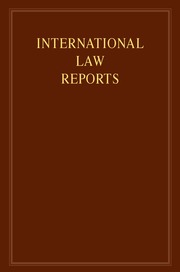No CrossRef data available.
Article contents
National Commissioner of the South African Police Service v. Southern Africa Human Rights Litigation Centre and Another
Published online by Cambridge University Press: 01 January 2021
Abstract
Relationship of international law and municipal law — Treaties — Customary international law — South African Constitution — Domestication of international agreements — Application of customary international law — Rome Statute of the International Criminal Court, 1998 — Implementation of the Rome Statute of the International Criminal Court Act 2002 — Convention against Torture and Other Cruel, Inhuman or Degrading Treatment or Punishment, 1984 — Alleged acts of torture committed in Zimbabwe by and against Zimbabwean nationals — Whether South African Police Service having power to investigate — Whether South African police having duty to investigate — Presence of an accused for the purposes of investigation — Universal jurisdiction — Limiting principles — South Africa’s domestic and international powers — Obligations to prevent impunity
International criminal law — Jurisdiction — Universal jurisdiction — Crimes against humanity — Investigation and prosecution — Alleged acts of torture committed in Zimbabwe by and against Zimbabwean nationals — Whether South African Police Service having power and duty to investigate international crimes committed outside of South African territory — Implementation of the Rome Statute of the International Criminal Court Act 2002
Human rights — Torture — Nature of prohibition of torture — Universal jurisdiction — Duty to investigate — Whether extending to acts committed on the territory of another State by foreign nationals not present in the forum State — The law of South Africa
- Type
- Case Report
- Information
- Copyright
- © Cambridge University Press 2011




